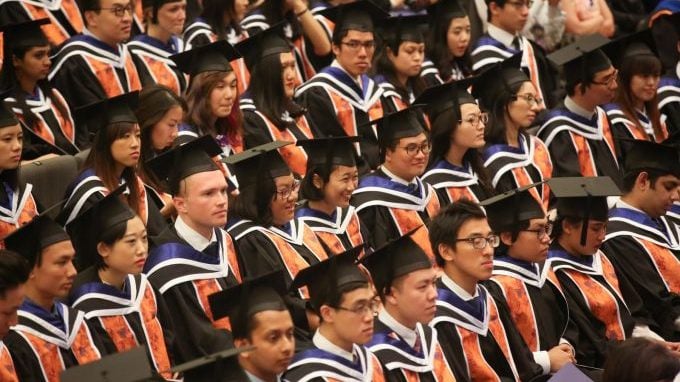An annual survey by the National University of Singapore (NUS), Nanyang Technological University (NTU) and Singapore Management University (SMU) released on 26 Feb shows that the proportion of graduates who secured full-time permanent jobs has plummeted from 79.9 per cent in 2016 to 78.4 per cent in 2017.
10.6 per cent of recent graduates from the top three universities here (NUS, NTU and SMU) who were surveyed, reported being in freelance, part-time and temporary jobs. This figure is up from 9.7 per cent of graduates who reported the same in 2016.
This, compounded with the fact that the unemployment rate among those under 30 climbed to 7.8 per cent in the second quarter of 2017 compared to 7.1 per cent one year ago, has caused concern among some analysts.
Analysts speaking to The Business Times recently expressed concern that graduates appear to be resorting to jobs that they are over-qualified for in greater numbers now.
Singapore University of Social Sciences (SUSS) professor Walter Theseira was one such voice who shared: “Standard surveys at best capture part-time employment as a measure of under-employment – they ask whether someone would like to be full-time employed – instead of part-time, for example and they don’t really get at this question of whether people are doing jobs they are overqualified for.”
Erman Tan, president of the Singapore Human Resources Institute (SHRI), also noted that the trend of recent graduates being underemployed is “beginning to be noticeable”. He added: “We’re producing more graduates but the economic structuring may not be enough to produce such jobs for their skills”.
Tan, however, offered that this trend could be driven by more younger people choosing to opt for jobs in the gig economy that offer them more flexibility and autonomy.
Maybank economist Chua Hak Bin echoed this sentiment and said that the statistics perhaps reflect the possibility that more young people are underemployed as they take up jobs in the gig economy as secondary sources of income as they further their studies.
On the other hand, Chua acknowledged that the statistics could reflect that some graduates who take certain degrees might really be struggling to land quality jobs: “There is some speculation that more millennials might be going for graduate studies, freelance or gig economy jobs and may not be counted in the data because part of that might be secondary or part-time jobs. But some could be graduates in certain degrees, such as in the humanities, who could be struggling.”
Is the gig economy to blame for graduate underemployment?
The Business Times article seems to draw a connection between the graduate underemployment statistic with more graduates joining the gig economy. Some analysts speaking to the writer opined that choosing jobs on the gig market is not necessarily a bad thing.
CIMB economist Song Seng Wun felt that gig economy jobs may improve one’s skills and that it might be worth being unemployed if it paves the way for better opportunities: “Whether it’s informal or formal work, all these are work-life experiences…We don’t know whether we are going to be a Deliveroo rider or a banker forever. There’s no good or bad job – a job is a job, as long as it creates economic activity.”
Song’s views, while practical, may not be useful to graduates who do not resort to gig economy jobs out of choice.
While some graduates have reported that they prefer gig economy jobs, others have reported that they are forced to work in short-term or freelance jobs they are overqualified for since they are unable to find a full-time permanent job they are qualified for.
One recent graduate interviewed by the writer, Reuben Su, revealed that he decided to take on freelance jobs after being unable to find a job for about six months. Another SIM graduate who is still looking for a job said that most of the students in his programme are still on the hunt for jobs, with many taking on temporary positions in customer service.
This was echoed by a 2017 NUS graduate who shared that some of her classmates have not been able to find a full-time job and have resorted to working as tutors or as interns at firms that pay less than S$1,000 a month.
CEO of recruitment agency Achieve Group, Joshua Yim, reported that graduates of humanities programmes take up jobs as tutors, customer service officers, surveyors and Uber drivers – volatile jobs that offer little job security and lack of dependable career progression.
Measure graduates’ satisfaction with jobs: analysts
The task of tracking underemployment may be difficult due to the subjective nature of measuring whether one is over-qualified. SHRI president Erman Tan suggested that future surveys be tweaked to capture whether graduates are satisfied with their first job to better gauge underemployment.
SUSS professor Dr Theseira added: “I would suggest that we explore adjustments to the graduate employment survey and other labour market surveys that do this, even though such measures may be less reliable than the traditional employment measures.”

